Pete Sutton's Blog, page 31
July 30, 2015
Guest Post - Maria Nieto
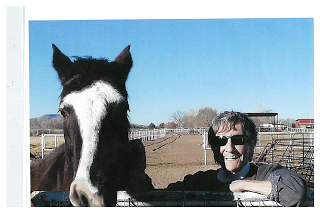
Maria was born in New York City but grew up in Spain. She's a graduate of Temple University in Philadelphia, and worked for several years teaching psychiatric nursing. After completing school, Maria moved to New Mexico and worked in the Navajo and Pueblo reservations offering psychological and counseling services.
Maria still lives in New Mexico enjoying the open spaces sometimes on horseback, sometimes on her mountain bike along the Rio Grande.
Maria wrote a book about the Spanish Civil War called - Breaking the silence and has dropped in to tell us about it.
Breaking the Silence is a book written about the Spanish Civil War in Spain many years ago. It is my first and perhaps my last book. I am 85 years old and I have never written a book before. I guess you must be wondering why a person my age decided to write a book. Well, there is a reason. Let me tell you about it as quickly as I can.
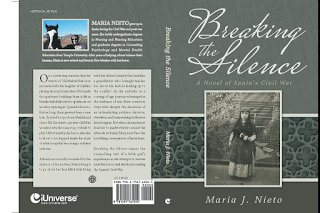
I was born in New York City but grew up in Spain from early childhood to my teen years. I was six years old when the Spanish Civil war began, a horrifying experience where I found myself in the middle of falling bombs and mortar shells killing everyone around me. What followed after the war may have been worse. The Spanish Republic lost the war, and the tyrannical murderous fascist dictator Francisco Franco placed Spain in a state of terror. All liberties were gone, thousands and thousands of people were executed every day, thousands more used for slave labor, and thousands imprisoned year after year. But one of the worse acts from this dictator may have been the well planned brain washing techniques used on children making them became loyal to the regime and alienated from their parents and family. Families of these children learned to fear them because of the possibility of being denounced, turned in to the police if they ever said or did anything against the regime.I was one of those children.
After some years of marching to the beat of drums and waving flags with my arm extended in a fascist salute, I was discovered reading a Reader´s Digest in Spanish. That was forbidden in Spain. No foreign books, papers or films were allowed. Because I was an American citizen, my father was given three days to get me out of the country. I was sent to Portugal where I waited for a ship to New York with seven Jewish children that had escaped Germany.
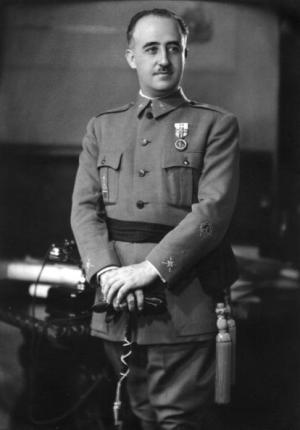 (General Franco)
(General Franco)I learned English all over again and graduated from High School and began roaming the streets of Greenwich Village beating drums in Washington Square with other groups of teenage pacifists. We were called “Beatnicks” at that time, and we wanted no more wars after the horrible Second World War ended.
Time passed, and I began to think and want to go to school but had no money. I joined the US Navy and after four years, the GI Bill of Rights paid for me to complete nursing school in Philadelphia´s Temple University. I worked teaching psychiatric nursing during the day and went to school at night. After many years of night classes, and finally having earned enough advanced degrees to help emotionally wounded people identify their problems, and to hopefully resolve them, I went to work.I moved to New Mexico and worked with the Navajo and Pueblo Indian people for three years in mental health, and then moved to Albuquerque working for the University of New Mexico’s Psychiatric Emergencies for the next 15 years.
When I retired, with no troubled personas to need my help, I began to feel a strange sadness and unrest. A deep weight settled in my chest, and as time passed, I clearly began to hear, remember and see my childhood friends suffering and dying under falling bombs, the fire of machine guns the explosions of mortar shells, as well as starvation. These were my friends, the children of Spain who died and as the years passed, were never remembered. I realized that a therapeutic exposure of the things I had witnessed in my childhood was a necessity for me. I had to remember and expose the things I had lived and experienced in order to be at peace with myself. Writing it down for others to read seemed the best way .
And so, I wrote Breaking the Silence to help the world remember what the people of Span did not want to discuss. Let me explain:
The people of Spain have been silent since the Civil War ended. First they were forbidden all liberties by Franco, the dictator that won the war, and later talking about the war or the years after the war was not allowed by the new king of Spain. A king who had supposedly been elected by the people after the dictator Franco died. To this date, Spain will not talk about what happened during or after the Spanish Civil War. The terrible war between families with the killing of brothers by brothers, fathers by sons and sons by fathers to prevent fascism and a dictatorship from happening . A war that Franco won with the help of Hitler and Mussolini, and the world powers did nothing to help. Shortly after the Spanish Republic lost the war, Hitler and Mussolini used the weapons they had developed and tested in Spain to kill millions of people in Europe, and the Second World War began.
Today Spain’s youth know little or nothing about the Spanish Civil War, or the terrible days after the war under a ruthless fascist dictator. The old were instructed by the king´s “Pact of Silence” law of 1977 to stay silent, and the murderous fascists during Franco’s dictatorship were never made to answer for their crimes after Franco died. Instead, these criminals continued to gather money and power from the new government and Spain as Spain continued to keep silent. I may have been a child during that time, but I can now remember and I can no longer stay silent. Breaking the Silence gives an account of what happened in the form of a fictional novel with some occasional humor, but the facts are real, the children that died in the book are real.
I am real, and now after writing the book, the weight in my chest is gone. I am finally at peace.I sincerely hope that people will read the book and be entertained as well as informed, and perhaps join the millions of humans who can no longer accept wars as a way of resolving differences between people.
Namaste,Maria Nieto
Published on July 30, 2015 07:58
July 28, 2015
What's your point of view? Adam Roberts's Bête
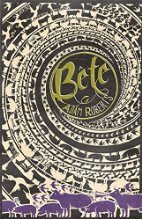
Bête by Adam Roberts
"A man is about to kill a cow. He discusses life and death and his right to kill with the compliant animal. He begins to suspect he may be about to commit murder. But kills anyway ...
It began when the animal rights movement injected domestic animals with artificial intelligences in bid to have the status of animals realigned by the international court of human rights. But what is an animal that can talk? Where does its intelligence end at its machine intelligence begin? And where might its soul reside?"There's that bit in Douglas Adams's seminal Hitchikers - ably played by Peter Davison (and the story goes that he really wanted to be in the program but was playing the Doctor at the time and could only be in it if heavily made up)
https://www.youtube.com/watch?v=C1nxa...
Which is a slightly more benign vision of the future than Roberts's. What if animals were given intelligence and the means of speech - would killing them be murder?
For this book Roberts chose to write in first person point of view (POV). Since over ninety percent (according to some sources) of speculative fiction is written in close third person POV why would Roberts choose to embed the entire story within an "I"? Apart from one part (no spoilers).
Really - if you are going to ask fundamental questions as to the nature of consciousness what POV would you use?
Many writing guides and blog posts concentrate on the limitations of first person POV, and many seek to avoid it altogether. John Gardner in his The Art of Fiction seems positively censorious of it saying that it lacks grandeur, is claustrophobic and makes narcissists of us all.
But to explore consciousness would it be useful to head hop? Exactly because we cannot know what another conscious being is thinking, except through tell-tale signs, that makes it a good reason not to use omniscient, which is out of fashion nowadays anyway. However a great many beginning writers have trouble with limited third person, slipping often into a hybrid of limited and omniscient (and not only beginning writers, I've been told - although have not read them - the Harry Potter books have occasional POV errors). But this is obviously not Roberts's failing and not the reason he chose first person.
Although one can only speculate I believe he chose first person for a couple of reasons. The first I alluded to above, that it accentuates the fact we do not know what other people are thinking, and how much truer would that be for animal consciousnesses which we tend to anthropomorphise? The second is more to do with the plot, which I won't spoil, but suffice to say it turns on our narrators withdrawal from society.
The conceit of the book is such that it is not only the nature of consciousness that you can meditate upon whilst reading but also man's relationship with nature. As well as, by using our relationship with animals, an object lesson in how people treat each other.
Roberts has the skill such that everything that happens seems necessary. It is a plot that simply works, all the various cogs and wheels running smoothly in the background beneath your conscious notice. It is therefore a very satisfying book. Of course B happened, because A happened and therefore there could be no other development. That this plotting appears effortless belies the skill involved.
There are other limitations with first person POV that can trip the unwary or inexperienced writer - there is a "tell" trap. Everyone by now must have heard the dreaded words - "show don't tell" - which is a whole other post (and something else beginning writers struggle with). But there is a tendency for first person POV to fall into letting the character tell what happens, rather than being in immediate scene. The book immediately picked up after Bête, for reasons of book club choice, was Day of the Triffids
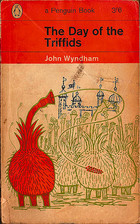
And despite being a massive fan of Wyndham when younger I am surprised to see that there are some issues with the first person POV in this book, especially as the narrator often adopts a lecturing tone to tell the reader things, that would have been much better parceled out.
But nothing like that trips Roberts up, and it could have done. The information about the chips that give the animals consciousness and speech is revealed through conversation and certainly not all in one chunk. Compare and contrast, if you will, the second chapter of Triffids which is one massive info dump, told to you by the narrator.
Writing in the first person is usually the best way to establish a deep and personal understanding of a single character whereas the third person is, according to received wisdom, more free in storytelling potential, although, of course has its limitations too.
One potential limitation is distance, although with very limited 3rd person this is somewhat mitigated. There is the possibility that the reader will spot the author's voice hiding in there (the more omniscient the more likely) and this could be another reason Roberts chose first person. You are in one head and one only and the author's voice is severely muted. He is using the fact that you are constrained in one head to examine the nature of only knowing what it is like to be being constrained in one head.
The main character's constant refrain of "Don't call me Graham" when his name is, in fact, Graham is also a canny nod to the nature of naming and individuality and the sense of self, which is inextricably linked with how we think of ourselves. This makes me want to write an article upon identity now...
By exploring the "what if" of one potential future, and it there is a degree of plausibility to it, Roberts has very much embraced the speculative in Speculative Fiction. Highly Recommended.
Published on July 28, 2015 07:37
Interview with A A Abbott
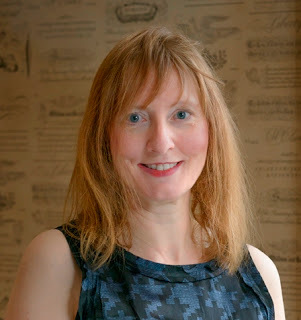
AA Abbott decided Bristol was a fun place to lose a bit of time, and to her surprise, has ended up living there for 10 years in a house that looks like an iced cake. Also known as Helen, she does temporary work, usually for enormous corporations. Sharply observed office politics occasionally slips into her colourful crime thrillers. New book, The Bride's Trail, features the City of London and an intriguing secret about Britain's second city, Birmingham - there's an extensive network of Cold War tunnels beneath the heart of the city...
BRSBKBLOG asked her all the usual questions...
For lots of freebies, including "5 minute crime thriller", The Gap - http://aaabbott.co.uk/free-stuff
Blog - http://aaabbott.co.uk
Twitter - https://twitter.com/AAAbbottStories
Facebook: - https://www.facebook.com/AAAbbottStories
Books: The Bride's Trail, After The Interview and Up In Smoke
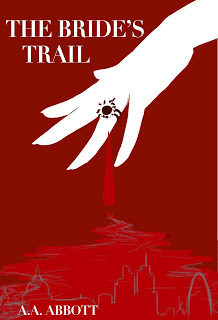
Tell us a little bit about your books
They're fast-paced crime thrillers, laced with suspense - readers love the ending, but they never guess what it is. The latest, The Bride's Trail. features a glamorous croupier who marries illegal immigrants for money. When she suddenly vanishes, her friends discover they're not the only ones looking for her - a killer's on her trail too. Who will find her first? There's a nail-biting finish!
You live in Bristol, does it feature in your books?
My full length crime thrillers are set in London and Birmingham, but Bristol doesn't miss out. I've written plenty of short stories about the city, including this chiller posted on YouTube under my real name: https://youtu.be/A82OPb4S38c
You've said you find offices fascinating - why is that?
Offices are like villages - buzzing with gossip and random people thrown together by fate. It's easy to imagine murder, fraud and espionage behind closed doors. My second thriller, After The Interview, was (surprise, surprise) about the aftermath of a bad interview - I bet lots of folk identify with that!
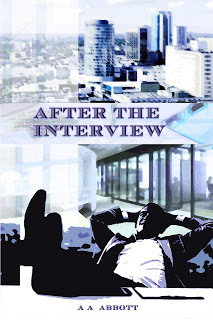
I've seen you tweeting about #TheCultureHour - what's that all about?
Twitter is my guilty pleasure - it's great for networking, news and sheer inspiration. #TheCultureHour runs every Wednesday night from 7.30pm to 8.30pm, and it's basically a chat about art, books, film and music. Anyone can join in - just use the hashtag #TheCultureHour. I'm addicted to it.
What inspired you to write thrillers?
I love reading them. I've always adored Ruth Rendell's darker suspense novels like The Tree of Hands. Kate Atkinson, too, shows sparks flying as dysfunctional characters interact. Finally, I adore that 80s blockbuster feel - a fast-moving plot, with lots of action. I knew I'd nailed it when After The Interview was described as "the literary equivalent of a Guy Ritchie film"!
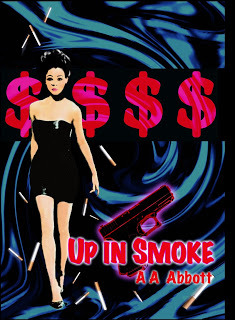
Which piece of writing are you most proud of?
Definitely new crime thriller, The Bride's Trail. It's my best yet.
If you could be a character from one of your books who would it be and why?
Alicia, in Up In Smoke. She's young, she's smart, she gets what she wants and she has fun!
Do you also write short stories? If so where can people find them, if not, why not?
Yes, I've had short stories published in several collections, and there are a few available to read on my website, including "5 minute crime thriller" The Gap. That's at http://aaabbott.co.uk/free-stuff. Sign up for my newsletters there and I'll send you an e-book of short stories, Something In The City.
What’s the one question you never get asked in interviews that you really want to answer?
"What's the secret of your success?" Believe it or not, it's having a great team to support me. Four people stand head and shoulders above the rest. They're Suzanna Stanbury, who chairs the Bristol Fiction Writers' Group, and three amazing dynamos in Birmingham: editor Katharine D'Souza, PR Donna Marie Finn and Twitter guru David W Massey.
In one sentence what's your best piece of advice for new writers
Join a writing group - feedback is your best friend.
Many thanks to AA Abbott (Helen) for the interesting answers!
Published on July 28, 2015 06:07
July 22, 2015
So, what about those reviews?
You wait ages for a blog post then two come along at once...
A couple of people have asked me, when I've mentioned I do reviews, what my star system is. People are used to Amazon/Goodreads & others that rate a book with a number of stars. Librarything even lets you do half-stars.
But I don't. I had an explanation of my "star" system (basically without the stars) on the 'Review Criteria' page of the blog (which has been updated following this post) I used to review on a 5 star rating scale but, although it offered good granularity, didn't really fit my needs. I then named the stars but dropped down to 4 categories a while ago (I used to have a "Bad" category but now I mostly just drop bad books without finishing them)
My categories were:
Unfinished - self-explanatory really, a book so bad or so dull I can't be bothered to finish it, so many books, not enough time means that I use the Pearl Rule generally (based on Nancy Pearl Rule of 50)(http://en.wikipedia.org/wiki/Nancy_Pearl)
Pearl's approach to enjoying reading is the Rule of 50 which states "If you still don't like a book after slogging through the first 50 pages, set it aside. If you're more than 50 years old, subtract your age from 100 and only grant it that many pages."
I supplement this - if someone I know (& respect their opinion of books) tells me it is a good book I'll probably give it 100 pages if it has a slow start (I abandoned Perdido Street Station the first time I read it but went back to it after prompting and really enjoyed it)
Average - also fairly self-explanatory, the book has done nothing to raise itself above the level of being an average example of the genre. I read it and it was OK but I doubt I'd recommend it. I didn't hate it but it didn't excite me either.
Good - Books that I rate Good are books that I've read and would say are a good example of the genre, ones that I'd be happy to recommend, ones that stand out somehow - maybe with an excellent plot or excellent characters, or maybe really cool world building but, and for this category there is always a but, there is a flip side. I'm likely to say things like "I really enjoyed the plot but the characters were a bit 2-D", or "The world building was amazing but the plot didn't do anything for me". Always leave yourself somewhere to go though (that's why I have a Brilliant rating) - people who get a Good rating should be happy with that rating, I can be pretty scathing when I don't like something.
Brilliant - These are the books you put in other people's hands and say "you have to read this", these are the books that I buy for friends and families as presents, these are books I can't fault, or whose faults actually add to their charm. These are the books that remind you why you read. They are the world changers, they are the books that make you laugh out loud on public transport or make you blub into your cornflakes (what do you mean you don't read at breakfast what sort of freak are you?) These are books that touch you (and I don't mean in the "show me on the dolly where the naughty man touched you" sort of way)
So why did I stop using my review category system (stars in all but name)?
Judging books on whether they are good or bad, no matter how many gradations there are, is just too narrow a focus (and yes I am the same person who has ranted about various movies and books on this very blog)
To read critically you can learn just as much about the craft of writing from 'bad' books as you can from 'good' books and what constitutes what's good or bad is, to a greater or lesser extent (depending upon your opinion) completely subjective.
At work we have a pile of books on a table that is a lazy library - take a book, leave a book (or leave a donation to the given charity). They tend to be 'airport' books - there are plenty of Grishams, and Pattersons, Cooper's and Picoult's.
Whilst I was browsing the titles and dismissing pretty much all of them a work colleague wondered what my criteria was for choosing a book.*
"I'm looking for something well-written" I said.
"How about this?" he said holding up a copy of a Dan Brown book.
I launched into a well worn groove of how the author was a hack and blah blah blah (I'm sure many writers could be prevailed upon to repeat why it is a badly written book)
"But it's sold millions of copies, lots of people love it, I love it, that makes it a good book." He said.
I obviously dismissed that argument** and thought nothing more about it (for quite some time)
I then got more and more involved in the "Lit scene" and started getting friends books to review and over time that review criteria started to be more and more problematic. I don't think I've finished that journey yet and there are good reasons why many writers don't review other people's books.
A common question writers get asked is "who influences you as a writer" and there is only one real honest answer to that, which is "everyone I read" because you can't just pick up a novel by, say, John Fowles (to choose a random novelist I admire) and go - "I'll just do what he did, it's easy" you also have to read stuff that you think "woah that was pretty bad, I must make sure to not do that in my own writing"
Also by classing books as 'bad' you are in danger of closing off stuff that seems the same, or another book by the same author, which could be awesome. Back to John Fowles - if I'd read Daniel Martin first, which I found turgid and pretty much unreadable (but persevered with for far too long because I'd loved the rest of Fowles's work) I may have thought to myself - this guy can't write, this book is bad, ergo all his books are bad. And I'd have missed out on some pretty formative literary adventures. (Fowles is definitely an influence on my own writing - although see previous statement about influences)
So, and this is an evolution of my thinking I'm just beginning to articulate, this is why I stopped using a review star system (or a derivative thereof) - not because it's dishonest (and not saying that I disliked a book could be seen as that I guess) but more that just rating a book is not the most interesting thing you can say about it.
I've been reviewing pretty much everything I've read for the last five years, first on Librarything and then on this blog. Joining Librarything in 2010 and doing a 10/10 challenge made me concentrate on reading like never before.
That reading challenge and the ones that have come each year after have had a profound effect. Getting re-engaged with literature (I did an MA in Publishing in 1997 but for reasons ended up in a career that had nothing to do with publishing) led me to the Bristol Festival of Literature in 2012 and to volunteering, and from there to running events in 2013, and to writing. Like most writers I started writing through a passion for reading.
In 2013 I started writing fiction (I'd been writing for a game for almost 20 years before that, but that also came to a close in 2013) and in 2014 my writing was taking up a lot more time - I read half the number of books in 2014 than I did in 2013. Now in 2015 I feel like I'm getting to a place where I'm going to have to make a choice.
Do I really want to review everything I read?
Do I just want to rate a book in a review? - Or do I want to have a conversation about it (the value of a book is subjective, but it may spark an interesting thought)
There is another fundamental at work here too. If you've ever tried your hand at writing, short stories, novels, whatever, then you know that it's actually a lot more difficult than it looks. It also drives home the difference between knowing what makes something good and being able to make something good yourself. There are a lot of reasons a book may be 'bad' (even in an objective sense) but it is still someone's brain-child. It is still the result of hard work (and writing is hard work, fun, but hard)
Besides that story, or book, may have been someone's first faltering steps into literature and it may get them noticed and get them a better editor next time, or allow them to write more, and any writer worth their salt seeks to improve with everything they write. In a few years time that writer may actually produce a great work. And they deserve encouragement. Even if it's truly execrable it's still a lesson. A possibility to discuss something interesting about the craft, about technique or about the business of publishing.
So that's why I'm ditching my pseudo star system (essentially it emerged from me defining what a 1 star, 2 star etc. book was). It is also why I'm changing the what and why I review as well as the how.
Usually in August the following year's challenge is posted on Librarything and is when I start thinking about how to challenge myself with my reading. This year my challenge to myself was to tackle Mount TBR, those hundreds of books that have entered the house but have not yet been shelved, due to not being read yet. The year before was based on "Book Bullets", books that received a high amount of recommendations and therefore became 'must-reads' (as well as challenging myself to read more women writers.) But last year I was still reviewing everything I read. This year, not so much.
This is due to a combination of spending my time writing other stuff (short stories and novels) and reading books that I am hesitant to put forth any feelings upon because they are written by friends. Added to that is the fact that I'm reading ever more 'Craft of writing' books (I know the answer is not inside the pages of a book - but they have become pretty addictive, and I get something useful from most of them - but then see the bit above about knowing what's good and execution...) which are pretty dull to review.
I read Doug Smiths - Playing the short game and he's very adamant about reviewing - his advice? "If you write, don't review." He covers a host of reason why you shouldn't, some of which I don't agree with, some of which I can see the logic of. But one thing that did strike me was the attitude that writing reviews was "an astounding waste of time." because you should be writing stories and novels, not reviews. I disagree but this has made me re-evaluate. Why am I reviewing?
I'm one of those people that clarifies their thoughts by writing them out or discussing them. And that's why I'm going to carry on reviewing things. But my thoughts previously have mostly been about 'is this book good' and from now on will be 'what does this book do that is interesting to discuss' and that's different.
Which brings me to my final point (hoorah) - What I'll review. Clearly, at this juncture, 'not everything' is a given. I am no longer (just) a reader so it is unfair of me, and also to me (as I don't want to make enemies) to be critical of fellow writers. So what does that leave? To try and find out what's most interesting about any given work and try and talk about it, hopefully in an intelligent way***
I would like to use the books I read to cogitate on matters and, as my thoughts are clarified when writing, my cogitations will make their way on to these pages.
So the best I can say is that if a book sparks a particular thought then I'll explore it here.
Like my other blog post today - the inherent problem I have with big books...
I will be doing one old style review still, for a book I've already started, which was a review request. But that is likely to be the last.
* Take all of this with a pinch of salt - something similar did happen although I can't really remember who the author was, but Brown suits my needs for illustrative purposes.
** I think I muttered something about thinking whatever the book was it was something I'd not read but had heard other people describe as bad writing, which was why I hadn't read it.
*** I owe a debt of thanks to Film Crit Hulk for much of the thinking in this. This particular sentence is almost a carbon copy of his 'mission statement' - "To try and find whatever is most interesting about a given movie, show, or subject and try to talk about it in as nuanced and thorough a way as possible."
A couple of people have asked me, when I've mentioned I do reviews, what my star system is. People are used to Amazon/Goodreads & others that rate a book with a number of stars. Librarything even lets you do half-stars.
But I don't. I had an explanation of my "star" system (basically without the stars) on the 'Review Criteria' page of the blog (which has been updated following this post) I used to review on a 5 star rating scale but, although it offered good granularity, didn't really fit my needs. I then named the stars but dropped down to 4 categories a while ago (I used to have a "Bad" category but now I mostly just drop bad books without finishing them)
My categories were:
Unfinished - self-explanatory really, a book so bad or so dull I can't be bothered to finish it, so many books, not enough time means that I use the Pearl Rule generally (based on Nancy Pearl Rule of 50)(http://en.wikipedia.org/wiki/Nancy_Pearl)
Pearl's approach to enjoying reading is the Rule of 50 which states "If you still don't like a book after slogging through the first 50 pages, set it aside. If you're more than 50 years old, subtract your age from 100 and only grant it that many pages."
I supplement this - if someone I know (& respect their opinion of books) tells me it is a good book I'll probably give it 100 pages if it has a slow start (I abandoned Perdido Street Station the first time I read it but went back to it after prompting and really enjoyed it)
Average - also fairly self-explanatory, the book has done nothing to raise itself above the level of being an average example of the genre. I read it and it was OK but I doubt I'd recommend it. I didn't hate it but it didn't excite me either.
Good - Books that I rate Good are books that I've read and would say are a good example of the genre, ones that I'd be happy to recommend, ones that stand out somehow - maybe with an excellent plot or excellent characters, or maybe really cool world building but, and for this category there is always a but, there is a flip side. I'm likely to say things like "I really enjoyed the plot but the characters were a bit 2-D", or "The world building was amazing but the plot didn't do anything for me". Always leave yourself somewhere to go though (that's why I have a Brilliant rating) - people who get a Good rating should be happy with that rating, I can be pretty scathing when I don't like something.
Brilliant - These are the books you put in other people's hands and say "you have to read this", these are the books that I buy for friends and families as presents, these are books I can't fault, or whose faults actually add to their charm. These are the books that remind you why you read. They are the world changers, they are the books that make you laugh out loud on public transport or make you blub into your cornflakes (what do you mean you don't read at breakfast what sort of freak are you?) These are books that touch you (and I don't mean in the "show me on the dolly where the naughty man touched you" sort of way)
So why did I stop using my review category system (stars in all but name)?
Judging books on whether they are good or bad, no matter how many gradations there are, is just too narrow a focus (and yes I am the same person who has ranted about various movies and books on this very blog)
To read critically you can learn just as much about the craft of writing from 'bad' books as you can from 'good' books and what constitutes what's good or bad is, to a greater or lesser extent (depending upon your opinion) completely subjective.
At work we have a pile of books on a table that is a lazy library - take a book, leave a book (or leave a donation to the given charity). They tend to be 'airport' books - there are plenty of Grishams, and Pattersons, Cooper's and Picoult's.
Whilst I was browsing the titles and dismissing pretty much all of them a work colleague wondered what my criteria was for choosing a book.*
"I'm looking for something well-written" I said.
"How about this?" he said holding up a copy of a Dan Brown book.
I launched into a well worn groove of how the author was a hack and blah blah blah (I'm sure many writers could be prevailed upon to repeat why it is a badly written book)
"But it's sold millions of copies, lots of people love it, I love it, that makes it a good book." He said.
I obviously dismissed that argument** and thought nothing more about it (for quite some time)
I then got more and more involved in the "Lit scene" and started getting friends books to review and over time that review criteria started to be more and more problematic. I don't think I've finished that journey yet and there are good reasons why many writers don't review other people's books.
A common question writers get asked is "who influences you as a writer" and there is only one real honest answer to that, which is "everyone I read" because you can't just pick up a novel by, say, John Fowles (to choose a random novelist I admire) and go - "I'll just do what he did, it's easy" you also have to read stuff that you think "woah that was pretty bad, I must make sure to not do that in my own writing"
Also by classing books as 'bad' you are in danger of closing off stuff that seems the same, or another book by the same author, which could be awesome. Back to John Fowles - if I'd read Daniel Martin first, which I found turgid and pretty much unreadable (but persevered with for far too long because I'd loved the rest of Fowles's work) I may have thought to myself - this guy can't write, this book is bad, ergo all his books are bad. And I'd have missed out on some pretty formative literary adventures. (Fowles is definitely an influence on my own writing - although see previous statement about influences)
So, and this is an evolution of my thinking I'm just beginning to articulate, this is why I stopped using a review star system (or a derivative thereof) - not because it's dishonest (and not saying that I disliked a book could be seen as that I guess) but more that just rating a book is not the most interesting thing you can say about it.
I've been reviewing pretty much everything I've read for the last five years, first on Librarything and then on this blog. Joining Librarything in 2010 and doing a 10/10 challenge made me concentrate on reading like never before.
That reading challenge and the ones that have come each year after have had a profound effect. Getting re-engaged with literature (I did an MA in Publishing in 1997 but for reasons ended up in a career that had nothing to do with publishing) led me to the Bristol Festival of Literature in 2012 and to volunteering, and from there to running events in 2013, and to writing. Like most writers I started writing through a passion for reading.
In 2013 I started writing fiction (I'd been writing for a game for almost 20 years before that, but that also came to a close in 2013) and in 2014 my writing was taking up a lot more time - I read half the number of books in 2014 than I did in 2013. Now in 2015 I feel like I'm getting to a place where I'm going to have to make a choice.
Do I really want to review everything I read?
Do I just want to rate a book in a review? - Or do I want to have a conversation about it (the value of a book is subjective, but it may spark an interesting thought)
There is another fundamental at work here too. If you've ever tried your hand at writing, short stories, novels, whatever, then you know that it's actually a lot more difficult than it looks. It also drives home the difference between knowing what makes something good and being able to make something good yourself. There are a lot of reasons a book may be 'bad' (even in an objective sense) but it is still someone's brain-child. It is still the result of hard work (and writing is hard work, fun, but hard)
Besides that story, or book, may have been someone's first faltering steps into literature and it may get them noticed and get them a better editor next time, or allow them to write more, and any writer worth their salt seeks to improve with everything they write. In a few years time that writer may actually produce a great work. And they deserve encouragement. Even if it's truly execrable it's still a lesson. A possibility to discuss something interesting about the craft, about technique or about the business of publishing.
So that's why I'm ditching my pseudo star system (essentially it emerged from me defining what a 1 star, 2 star etc. book was). It is also why I'm changing the what and why I review as well as the how.
Usually in August the following year's challenge is posted on Librarything and is when I start thinking about how to challenge myself with my reading. This year my challenge to myself was to tackle Mount TBR, those hundreds of books that have entered the house but have not yet been shelved, due to not being read yet. The year before was based on "Book Bullets", books that received a high amount of recommendations and therefore became 'must-reads' (as well as challenging myself to read more women writers.) But last year I was still reviewing everything I read. This year, not so much.
This is due to a combination of spending my time writing other stuff (short stories and novels) and reading books that I am hesitant to put forth any feelings upon because they are written by friends. Added to that is the fact that I'm reading ever more 'Craft of writing' books (I know the answer is not inside the pages of a book - but they have become pretty addictive, and I get something useful from most of them - but then see the bit above about knowing what's good and execution...) which are pretty dull to review.
I read Doug Smiths - Playing the short game and he's very adamant about reviewing - his advice? "If you write, don't review." He covers a host of reason why you shouldn't, some of which I don't agree with, some of which I can see the logic of. But one thing that did strike me was the attitude that writing reviews was "an astounding waste of time." because you should be writing stories and novels, not reviews. I disagree but this has made me re-evaluate. Why am I reviewing?
I'm one of those people that clarifies their thoughts by writing them out or discussing them. And that's why I'm going to carry on reviewing things. But my thoughts previously have mostly been about 'is this book good' and from now on will be 'what does this book do that is interesting to discuss' and that's different.
Which brings me to my final point (hoorah) - What I'll review. Clearly, at this juncture, 'not everything' is a given. I am no longer (just) a reader so it is unfair of me, and also to me (as I don't want to make enemies) to be critical of fellow writers. So what does that leave? To try and find out what's most interesting about any given work and try and talk about it, hopefully in an intelligent way***
I would like to use the books I read to cogitate on matters and, as my thoughts are clarified when writing, my cogitations will make their way on to these pages.
So the best I can say is that if a book sparks a particular thought then I'll explore it here.
Like my other blog post today - the inherent problem I have with big books...
I will be doing one old style review still, for a book I've already started, which was a review request. But that is likely to be the last.
* Take all of this with a pinch of salt - something similar did happen although I can't really remember who the author was, but Brown suits my needs for illustrative purposes.
** I think I muttered something about thinking whatever the book was it was something I'd not read but had heard other people describe as bad writing, which was why I hadn't read it.
*** I owe a debt of thanks to Film Crit Hulk for much of the thinking in this. This particular sentence is almost a carbon copy of his 'mission statement' - "To try and find whatever is most interesting about a given movie, show, or subject and try to talk about it in as nuanced and thorough a way as possible."
Published on July 22, 2015 07:13
TL:DR - I like big books (and I cannot lie)
I'm reading The Vorrh
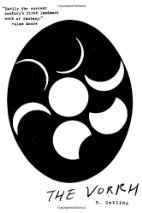
and it is a thing of beauty:
[image error]
and I'm 1/5th of the way through and it is 500 pages long
The dream had hollowed him; no trace of rest remained as he crawled into the morning, defeated and abused. Hot water did nothing; the stain of the night was indelible. He dressed grudgingly, tightly buttoning himself into a costume of scratchy, irritant lies. With one gulp of bitter black coffee, he walked out of his room and into the day, speaking to nobody, Outside the hotel, the heat had waited, ready to pounce.
It's often lush, meandering prose is a delight.
And yet.
Anyone who has seen my TBR (To Be Read pile) will understand that there is a counterweight, a massive drag factor, when it comes to jumping into big books. I read a lot of books, around 100 a year on average (I can hear some of my even more bookish friends scoffing that hundred books isn't so many) and by that count I have more than a couple of year's reading patiently waiting for me to get round to it on my TBR.
I also get sent several books every month by the publishers I review for ( I don't just review here)
So, when I pick up a book like this one I have two diametrically opposed desires. The first will be familiar to you, if you've ever been lost inside a story, as wanting to savour the rich texture of the prose and meander slowly through the experience. The other is to finish the book as fast as possible and get onto the next in the list.
The books in the corner of the library. The ones that have not even been shelved yet, due partly to there not being enough shelf space (I don't have too many books, I have too few shelves!) and partly because until they've passed the readibility test they are not worthy to sit amongst former literary love affairs. Those books create a drag effect. Every time I venture into the library (or more prosaically, the spare room) their presence makes itself felt. "We're still here." they whisper drily.
So I am always nervous of taking on a big book. It must grab me, it must overcome the inertia generated by the massive TBR. I am 1/5th of the way through The Vorrh, and I will finish it, and although I recognise its merits, I can't help resent it a little. I could have read two or three books in the same time. Two or three books would have seemed to have chipped away a bigger space on the TBR.
I like big books, but sometimes I wish for faster reads.

and it is a thing of beauty:
[image error]
and I'm 1/5th of the way through and it is 500 pages long
The dream had hollowed him; no trace of rest remained as he crawled into the morning, defeated and abused. Hot water did nothing; the stain of the night was indelible. He dressed grudgingly, tightly buttoning himself into a costume of scratchy, irritant lies. With one gulp of bitter black coffee, he walked out of his room and into the day, speaking to nobody, Outside the hotel, the heat had waited, ready to pounce.
It's often lush, meandering prose is a delight.
And yet.
Anyone who has seen my TBR (To Be Read pile) will understand that there is a counterweight, a massive drag factor, when it comes to jumping into big books. I read a lot of books, around 100 a year on average (I can hear some of my even more bookish friends scoffing that hundred books isn't so many) and by that count I have more than a couple of year's reading patiently waiting for me to get round to it on my TBR.
I also get sent several books every month by the publishers I review for ( I don't just review here)
So, when I pick up a book like this one I have two diametrically opposed desires. The first will be familiar to you, if you've ever been lost inside a story, as wanting to savour the rich texture of the prose and meander slowly through the experience. The other is to finish the book as fast as possible and get onto the next in the list.
The books in the corner of the library. The ones that have not even been shelved yet, due partly to there not being enough shelf space (I don't have too many books, I have too few shelves!) and partly because until they've passed the readibility test they are not worthy to sit amongst former literary love affairs. Those books create a drag effect. Every time I venture into the library (or more prosaically, the spare room) their presence makes itself felt. "We're still here." they whisper drily.
So I am always nervous of taking on a big book. It must grab me, it must overcome the inertia generated by the massive TBR. I am 1/5th of the way through The Vorrh, and I will finish it, and although I recognise its merits, I can't help resent it a little. I could have read two or three books in the same time. Two or three books would have seemed to have chipped away a bigger space on the TBR.
I like big books, but sometimes I wish for faster reads.
Published on July 22, 2015 03:03
July 20, 2015
Some reviews
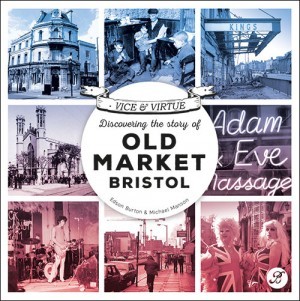
Old Market is an area of Bristol just off the main shopping area. It’s kind of isolated by a big interchange and is known, now, as Bristol’s gay quarter. Around twenty years ago I lived there for a year or so. This book explores the history of this small area. The title of the book is in reference to the churches and the red light nature of the area. There are a bunch of interesting buildings in the area, including Trinity - a former church turned community centre and occasional music venue and the location of Bristol’s anarchist book fair (there is also an anarchist bookshop in Old Market) & the old gin palace (Palace hotel). This books explores the history of these two iconic buildings, as well as many more. The area has a rich history which is ably brought to life by the two authors who spent eighteen months in research and interviewing many of the current and former residents.
Overall – Does exactly what is says on the tin, gives you a history of an area in Bristol
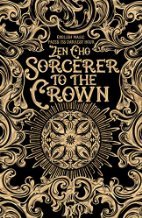
“In the tradition of Jonathan Strange and Mr Norrell” It’s a tough act to live up to, and possibly an unfair comparison. Regency period, check, magic, check, English magic in decline, check and yet that’s as far as the comparison goes. Cho has a superlative grasp of the language of the period - ”May I ask what possessed you to wreak such wanton destruction upon my conveyance?” he said in an indignant whisper. “I cannot conceive how you think I will contrive to take you to London in a chaise that has no wheels.” You may take this as either a strength of the book, or as a weakness depending on your reading habits.
Zacharias, a freed slave, has been elevated to Sorcerer Royal, during a period of decline in English magic, taking himself to the borders of Fairyland to investigate he stops off at Mrs. Daubney's School for Gentlewitches, a girl’s school which teaches its pupils that ladies do not perform magic, as is only proper. There he meets a gifted dark-skinned orphan with a mysterious provenance and decides that women should, after all, be taught magic.
This book does well on the diversity front, adding PoC and women as prominent characters and has an intriguing premise but, for me, it didn’t quite deliver on its promise.
Overall – If you love regency romance and think it can be improved with magic then you should check this out
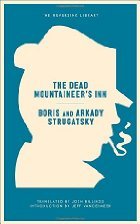
Inspector Glebsky goes on vacation at the Dead Mountaineer’s Inn, a remote ski chalet past the bottleneck pass, and expects to relax in solitude. He finds the inn inhabited by a host of bizarre characters, including a stage hypnotist and his ward of indeterminate gender, an incredibly rich couple, a physicist mountain climber and others. When an avalanche cuts them off and there is a dead body which may, or may not be human, Glebsky is forced to investigate, even if he usually only specialises in fraud.
This is an odd little book, which shifts from farce to science fiction and is well written but never really did it for me. I’m just not a big fan of farce. I had similar problems with The master and margarita which this book reminded me of, with its surreal comedy, that failed to make me crack a smile. There is a nice introduction by Jeff VanderMeer though and I enjoyed this book a lot more than Bulgakov’s.
Overall – Zany oddball comedy crossed with a 1940’s scifi film that subverts the tropes of detective fiction
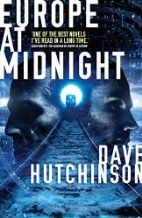
This is a second book in the same world as the marvellous Europe in Autumn although I expect you can read this as standalone without missing too much, as it’s not a direct sequel. Hutchinson himself describes it as a spin off and there is a third book in the ‘series’ in production. The book concentrates on two main characters, both intelligence officers, but very different. Europe is splitting into ever smaller polities, breakaway micro-nations like the city of Dresden who have built a hundred foot wall around themselves and an economy built on information. The Xian flu has decimated the population of Europe and there are a great series of economic crises. If this wasn’t bad enough Jim is recruited into a new department when a stabbing on a London bus holds the key to an invasion by a nation from another universe.
Although the book feels as though it loses its way a little towards the end, and leaves things open for the third book, the first three quarters are utterly gripping and kept me turning the pages fully immersed in the fascinating world Hutchinson has conjured and is therefore well worth seeking out.
Overall – Excellent addition to the Europe in Autumn World, I look forward to seeing what Mr Hutchinson does with the third book.
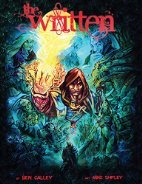
Ben Galley is a self-published fantasy author whose Written books have enjoyed a lot of success. The first volume of the series has now been turned into a gorgeous graphic novel, via a kickstarter.
https://www.kickstarter.com/projects/...

Farden is one of the Written, a sorcerer, and he is tasked with a quest. Something has gone missing from the libraries of Arfell. Something very old, and something very powerful. Five scholars are now dead, a country is once again on the brink of war, and the magick council is running out of time and options. This is a tale of magick (with a k apparently), dragons, drugs and betrayal. I’ve not read the book, so can’t say if it’s a good adaption but expect it is with the same author. The art is very good, although occasionally the transitions are a little hard to follow and the plot uses a bunch of fantasy tropes, but gives them enough of a spin to keep your interest. Some of the backers had their images included in the art, which is pretty cool.
Overall – Gorgeous art, interesting Kickatarter project
Published on July 20, 2015 02:32
July 17, 2015
Interview with Ieva Melgalve
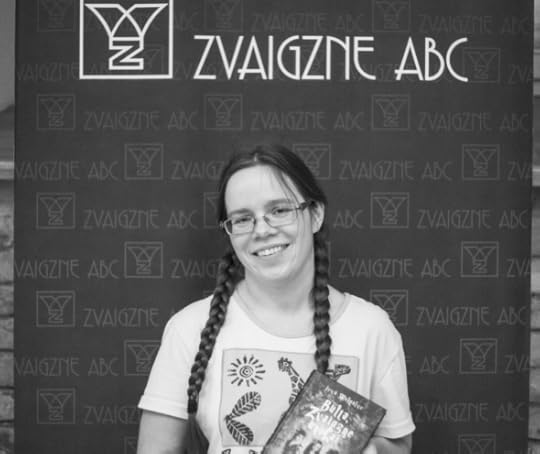
(image by Spīgana Spektore (http://www.spigana.com/),
Ieva Melgalve is a Latvian writer from Riga. She writes poetry, plays and novels as well as teaches writing. Her novel - The Dead Don't Forgive was nominated for the Latvian Literature Award of the year.
Bristol Book Blog met Ieva at the fantastic Archipelacon and asked her a few questions about her writing
For anyone who doesn’t speak Latvian can you tell us a little bit about your work?
I started out as a literary/experimental writer and then switched to fantasy and science fiction. My fantasy novel "The Dead Don't Forgive" is set in a world where emotions are magic, able to bind and control "common people". A rogue mage fights her conscience - and her troubled past - to unravel the mystery that surrounds multiple deaths in a mountain town. My middle grade fantasy novel "Arrow, Star and Laee" is set in the stone age and deals with three children, who, exiled from their tribe, travel to the land of the elves. And my upcoming SF novel "The Moon Theater" is about the last remnants of civilization after World War III - a set of actors in a huge theater, trying to break away from the arbitrary rules of their scenarios.
Your work has been translated into various languages but not English (yet) – any translation deals on the horizon?
It's not really been translated much - just some fragments in Swedish and a short story, "A Siren's Song" that was published in "A Capella Zoo" and should still be available online. Getting your work translated from Latvian takes about as much work as actually writing a new novel, so right now I am concentrating on the latter. Probably it's not very business-like, but then again I have been publishing fantasy and SF for slightly more than three years - I am hoping that my best and most translation-worthy work is not written yet.

You’ve mentioned a Latvian Writers retreat – can you tell us a little bit about that?
There are two retreats, one of them is located in Dubulti and belongs to the Latvian Writers Union. The other is an International Writers' and Translators' House in Ventspils, the website is here: http://www.ventspilshouse.lv/index_en.php. Both places are very near the sea, which, of course, provides a special inspiration. In both places, you can either rent a room for a while, or apply for a grant and stay for a month. The summers are warmer, but I have always found that the best time to write is autumn, with the morning fog that covers everything except the bright orange-and-red treetops.
You’ve written for plays and for children as well as poetry and novels, what’s your favourite medium and why?
Every idea demands its own form, so that' s not always a matter of choice. I feel most comfortable in novels, where I have a chance both to explore an idea fully and to indulge in small digressions. But honestly, my favorite medium is poetry, because I can't really write good poetry. So poems are an indulgence for me, a form which is both a mystery for me (I seem to be unable to figure which of my poems are any good and how I should edit them) and one that is closest to the natural imagery and phrases in my head.
You also teach writing, how did that come about?
I have always liked to work with aspiring authors (even when I was an aspiring author myself). So when I learned that the Latvian writing course/workshop lacked a teacher for practical tasks, I seized the opportunity to start helping them, and I have kept doing it, taking small breaks only in emergency situations (like, for example, giving birth to a baby). I have taken many courses by other writers, and read many how-to writing books, but I have learned the most from my students.
If you could be a character from one of your books, who would you be and why?
I most likely want to be an elf from "Arrow, Star and Laee" - a magical being said to be beyond good and evil, and one whose life starts in magic and ends in pure light. However, since even my imaginary life does not go as I would prefer, I would most likely be Mime from "Moon theater", a genderqueer android stagehand who has just started to gain awareness and is trying to figure out how the mind works, and what it really means to be alive, to remember, to feel, and to suffer.
[image error]
You are also a critic as well as a writer, how do you balance the two?
The literary scene in Latvia is so small that many writers dabble as critics now and then, so we have learned to be... well, usually very gentle and polite, with a venomous stab here and there. My ground rule is not to review books that I don't like. If I don't like a book, it's very hard for me to figure out what are the books strengths. I believe that reviews are mainly meant for the people who would like the book - a review serves best as a guide and adviser, not as a warning Not To Read That Crap. So, as a result, my reviews, even though not sugary, are usually kind enough, and I don't have to check my mail for Siberian plague and pipe bombs.
Would you say Latvian fiction differs from other countries’ fiction, and, if so, how and why?
First of all, we have a very rich and controversial history to draw upon, so there are many good memoirs and novels exploring that history. And we have an incredibly rich language, which is a pride of many writers. But actually, I like Latvian poetry much better than Latvian fiction - we have many excellent poets, some of them even translated into English. This year, Kārlis Vērdiņš' book "Come To Me" was published by Arc Publications, and for anybody who loves poetry, it would be a treat.
What’s the one question you never get asked in interviews that you really want to answer?
"Oh, by the way, I have a couple of bottles of Latvian craft beer from Malduguns brewery, would you like to have them?" - To which I would gladly answer, "yes".
In one sentence what’s your best piece of advice for new writers?
Always write as well as you can at the time, but not better. [OK, if this sounds confusing... For many writers, new or accomplished, the worst stumbling block is trying to write "better than they can", which leads to writer's block, self-loathing and misery, while working right on the edge of your capability is what makes you grow.]
Many Thanks to Ieva and we at Bristol Book Blog would love to see her work translated into English...
Published on July 17, 2015 01:52
Guest Post - Richard Jones - The Politics of Crowdfunding


Today Richard Jones, from Tangent Books has dropped by to talk about Crowdfunding.
Take a look at his Fundsurfer page here
[image error]
I wonder how many friendships have been broken and maybe even relationships ended by crowdfunding.
You see, a crowdfunding campaign isn’t all about raising money, it’s mainly about trust and expectations. You trust that certain friends, family and colleagues will support you. You expect them to do so because you sponsored their kid for a fiver or donated to a charity when they asked you.
When those people don’t respond to your crowdfunding campaign, it’s all too easy to take it personally. Although with some people it’s actually quite cathartic – deep down you always thought they were a tosser and their lack of support confirms this.
But sometimes it’s hurtful. People you like and respect, shun, spurn and avoid you. Why?
Before I started a campaign to fund the reprint of Stanley Donwood’s lost ‘classic’ Catacombs of Terror! I was warned that the above scenario is common to everybody who takes the crowdfunding route.
The solution is twofold.
1. Don’t take it personally. Difficult.2. Be very specific. Easy.
So, I compiled 20 lists of 10 people (to reduce chances of emails going in spam folder) and emailed the same general message. It asked for their support, pointed out that many people who said they would back the campaign also asked to be reminded, and gave them the option to be removed from the list if they were not interested.
Five people said they didn’t want to contribute, about 20 contributed, another 10 asked to be reminded closer to the deadline. Some of these were people whose campaigns I have personally backed.
Great. We hit 10 per cent of our funding and had about 150 people who wanted reminding. So I was fairly confident that the next email would get a decent response. Instead we got zilch, nada, zero from that mail out, although we did get some pledges from people we don’t know.
So what next? Well it’s time to get personal and invoke solution 2 (above). I’ll now email people individually and specifically ask them to pledge and to share the links on Facebook, Twitter etc. It’s not a question of harassing people, I just need to know whether they intend to support the project. If they don’t want to I can concentrate on finding new people who are interested in the book. And of course, I will never help those who rejected me or members of their family in any way, ever again (joke).
[image error]
But the really important thing is to look at the big picture. Crowdfunding is vital for radical, independent publishers such as Tangent Books. It’s a way of communicating with a global network who share Tangent’s values.
I’ve worked in publishing all my adult life, as a newspaper journalist and sub-editor, magazine editor and book publisher. I see my role as disseminating information and I’m really not too bothered whether that’s in print or digitally. For me, the message is of primary importance, the format is of secondary consideration.
Crowdfunding offers a radical solution to a retail industry that has centralised (Waterstones) and globalised (Amazon). Let me tell you, there is no pleasure in dealing with Waterstones while Amazon represents some of the things I hate in life – it ruthlessly exploits people, it is greedy, it gives nothing back. It’s also essential for publishers.
So crowdfunding offers an alternative to the all this. Sure, it’s frustrating, yes you feel let down by people you thought would behave better and of course, you’re overwhelmed by the generosity of many people.
Supporting my crowdfunding campaign is a political act. It’s a bit like buying Fairtrade products. You can choose to support independent publishers and authors or you can fuel the greed of Amazon.
And look, I haven’t even told you anything about the project. Go look for yourself. Share the link, make a pledge, the book is going to be gorgeous. And if you know anything about collecting books, check out the signed copies of the original edition. They could be worth a few bob in years to come.
[image error]
Go to…
https://www.fundsurfer.com/project/ca...
--------------
Back in 2012, before starting this blog, I reviewed Stanley Donwood's Household Worms on Amazon - I gave it 5 stars. Bristol Book Blog thinks you should go and fund this project, because we want to read the book & expect it to be on the list of "Year's Brilliant Reads"
Published on July 17, 2015 01:21
July 10, 2015
Review of Demon Dance by Brian Freyermuth
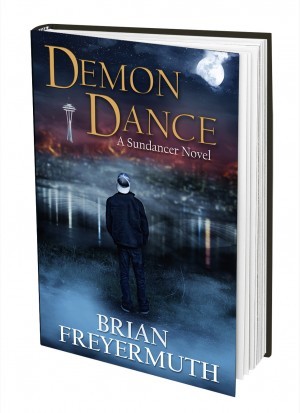
Freyermuth has created an enjoyable Urban Fantasy in this, a first in a series. He's taken In Media Res to heart and we get dropped straight into a story that feels as though it is part of an ongoing story. So much so in fact that I wondered if there'd been another book before this one. Our hero, snarky, Nick St James, is a former private investigator, who appears to have a few problems with authority.
The book opens with Nick, attempting to put his old life behind him, due to reasons (that are made clear later in the book), accosted by Coyote, the Native American trickster god. Coyote puts him in peril and then delivers a dragon scale that a dragon wants him to have for reasons (that are not made so clear later in the book).
Then Nick is visited by a vampire, that he knows from his former life, the sister of his dead wife and then there are demons and angels and a plot involving a homeless shelter, a senator and a child.
This is an entertaining read in the vein of Jim Butcher and does to Seattle what Butcher does to Chicago, populate it with an interesting cast of supernatural folk. Nick's powers as a Sundancer (what he is, and how he came to be that way are never described in the book) come in handy but he still gets the crap kicked out of him at every turn.
There are a few flaws with the book, the lack of explanations being one, but it is a fine first book and an enjoyable read. Once Freyermuth hits his stride, a book or two down the line, he'll be someone to watch.
Overall - If you're a fan of the Dresden Files you'll enjoy this
Published on July 10, 2015 05:09
July 7, 2015
Interview with Mats Strandberg

Mats Strandberg, together with Sara B Elfgren wrote the popular Engelsfors trilogy (The Circle, Fire and The Key) about teenage witches in Sweden. He has previously published three novels, and been a columnist in Swedish newspaper Aftonbladet.In September 2015 Mats's horror novel "Blood Line", which he summarizes as "Stephen King on a cruise ship" will be released.
I asked Mats a bunch of questions about his writing
You have a new book coming - can you tell us a bit about it?
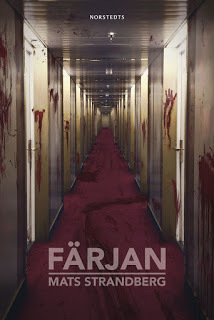
Well, it is set on a cruise ship between Sweden and Finland. These 24-hour ”booze cruises” are quite infamous in both countries, and I realized they were a perfect setting for a horror story. The cell phones don’t work, and there is no way to escape. I thought a lot about the Alien films – you know, ”On the Baltic Sea, no-one can hear you scream”. I also thought of mythological ships, and the Demeter in Dracula. What is so great about these ships is also that they provide a microcosm; I could populate it with the party girls, the family reunion, the tired truck driver, the lonely old woman looking for adventure, the man who is going to propose on the cruise. And also the staff; the security guards and bartenders and the bitter former Eurovision star whose career has gone so far downhill that he is now hosting the karaoke nights on board. The book comes out in Sweden in September and is called ”Färjan”. My agents are calling it ”Blood Line” when talking about it abroad, we’ll see if that’s a title that sticks if it gets published in the UK or US.
Your previous three books, the Urban Fantsy - Englesfors trilogy, were written with co-author Sara B Elfgren, how did that collaboration come about?
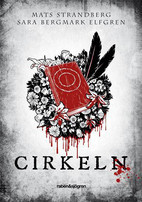
We met through a mutual friend. I had written three novels, and Sara was working as a script editor for a big movie company. We soon discovered that we had a lot of mutual likes and dislikes in pop culture. We decided to try and write together, something that focused on teenagers in a small, industrial town. We wanted them to be forced to get to know each other, and themselves, by having to work together towards a common goal. We wanted a coming of age-story that could also be a real pageturner. So we decided that they were witches, Chosen Ones who had to stop the apocalypse. We were incredibly naive. We just went for it, even though we hardly knew each other. It could have gone terribly wrong. We had no idea that this trilogy would swallow our entire lives for 5 years. But Sara is the best co-writer one could ever ask for.
What's it like to create in collaboration as opposed to solo - what are the ups and downs?
Well, the wonderful thing about being two authors is that everything gets twice as good in half the time. I was looking forward to writing my own novel, but I had forgotten how much time it takes – not just the actual writing, but also coming up with ideas, and trying to sort out the good ideas from the bad. And writing is a lonely job – especially when you are used to sharing the kicks with someone. The upside to writing yourself is that you get to decide everything. You are God.
Why do you choose to write horror
Honestly, and I know this sounds super corny, but I feel that horror really chose me. Stephen King made me fall in love with reading when I was 10, and I’ve loved the genre ever since. For me, horror has been such an important outlet. Watching a good (or bad in a good way) horror movie releases so much anxiety for me, relieves me of so much stress. It is the best kind of escapism for me, because it really grabs your attention. And also it has made me appreciate my life – my problems don’t seem so bad compared to the guy getting his leg sawn off by inbred cannibal clowns. As a writer, the same things apply. But also, it’s such a good genre to explore characters and big questions about life, death, good, evil, humanity and the inhumane…
That trilogy is published in over 20 countries - do you collect the foreign editions?Did you get a lot of input into the translations? Are your other books going to be translated into English?
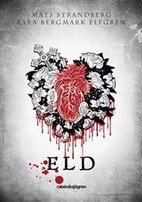
It’s even more by now – we’re translated into 25+ languages and published in even more countries (like the UK versions for example, they are also published in other English speaking countries across the world). English is really the only language that me and Sara know well enough to have an actual input on. The UK (Hammer) and US (Overlook) publishers have been kind enough to let us read the translations before they were printed, but it is still hard to know if certain nuances come through. I hope the new book will find its way to the English market as well. It was just sent to the printer’s here in Sweden, so my agents haven’t been able to shop it around yet. Fingers crossed!
If you could be a character from one of your books who would it be and why?
That’s a hard question, because none of my - or mine and Sara’s - characters have especially enviable lives, ha ha. We put them all through some serious stuff. But of course, there are some magical powers from the Engelsfors trilogy I would love to have. I have wanted to be able to fly ever since I saw my first Superman movie.
Do you also write short stories? If so where can people find them, if not, why not?
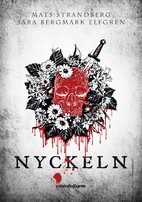
Actually, I don’t. I have never been a big reader of short stories, and I think it takes a certain mindset as a writer to pull it off.
What’s the one question you never get asked in interviews that you really want to answer?
”So, how did it feel to win the Nobel Prize for literature?”
In one sentence what's your best piece of advice for new writers
That thing about ”write what you know” is crap – write what you want to read instead.
Many thanks to Mats for the answers. Here is a trailer for the new film based on Circle that you can check out:
Published on July 07, 2015 01:45
Pete Sutton's Blog
- Pete Sutton's profile
- 14 followers
Pete Sutton isn't a Goodreads Author
(yet),
but they
do have a blog,
so here are some recent posts imported from
their feed.



